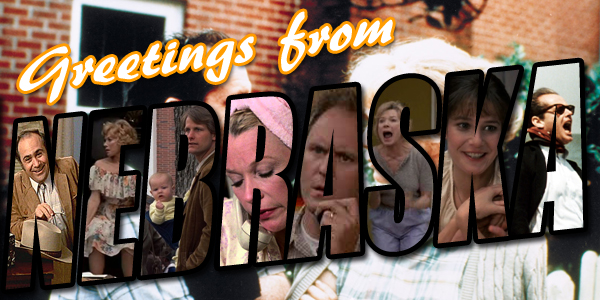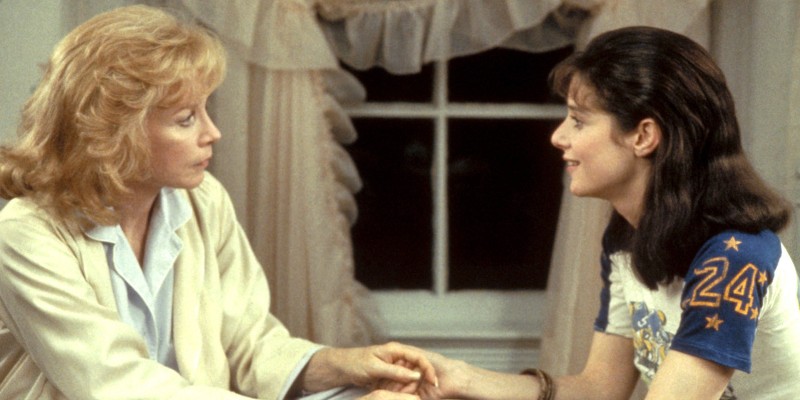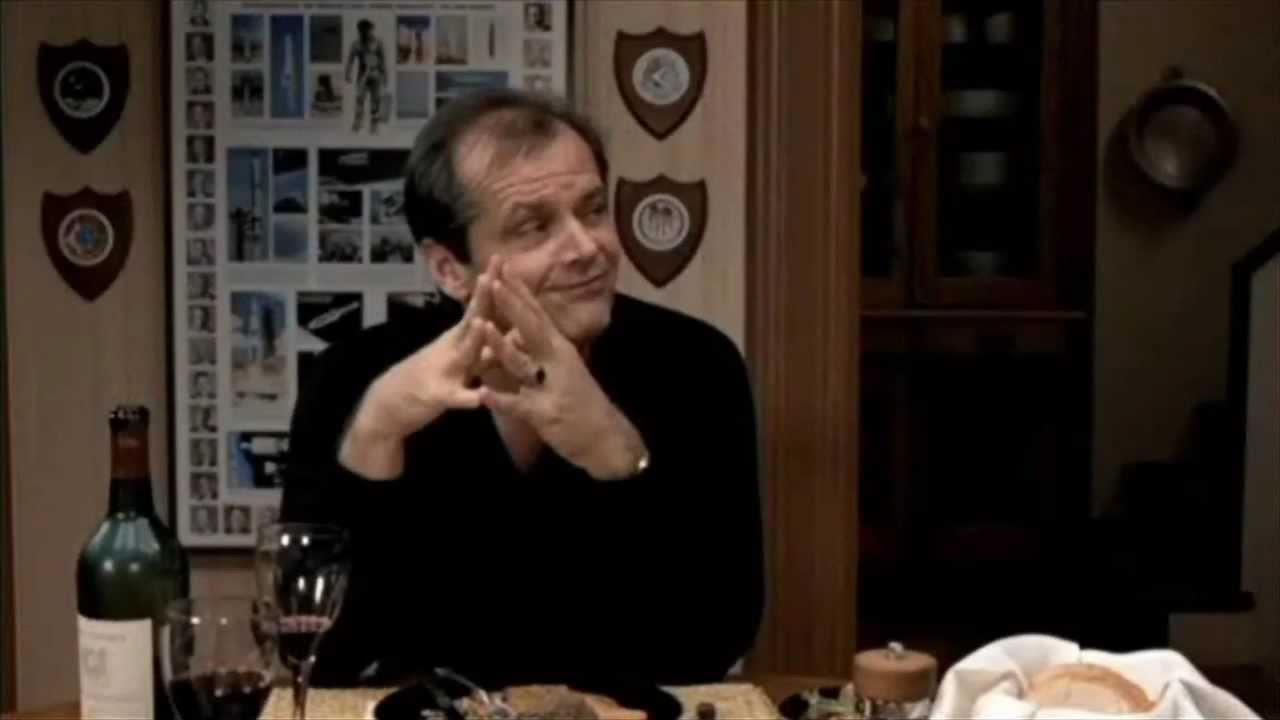
I’ve always wanted to travel across America. I’ve been a few times, to the major tourist attractions – Disneyworld in Florida, Vegas in Nevada, Cheers in Boston – but there’s so many places I’ve never seen in person, and most likely never will. Fortunately, there’s a solution, and it’s my own personal remedy to all life’s problems: movies. There’s been a movie set literally everywhere. Everywhere! So, this feature sees me cinematically visit a new state every week, through a film that was set there. You can read my journey so far here. Next up: Nebraska!
I know I’ve picked some obvious choices in the past when selecting which films I watch for which state, but I figured I wouldn’t go the blatant route of actually picking Alexander Payne’s Nebraska for Nebraska. Instead, I hit that fountain of all trustworthy knowledge known as Wikipedia to see what other movies were set in Nebraska. As it turns out, not a great deal, and even fewer that I actually wanted to watch, but which I hadn’t already reviewed elsewhere before. One such film that stood out, however, was Terms of Endearment, a film I’d heard about as being at least halfway decent, and which promised to exacerbate my cinematic equivalent of the Bends, going from Oklahoma! to South Park and then to this. I can’t think of a more different collection of movies, especially when you add The Texas Chain Saw Massacre too. However, in picking Terms of Endearment I had another case similar to My Own Private Idaho, in that as it turns out, not a great deal of the movie is set in the chosen state. Ah well, such is life.
Terms of Endearment tells the story of a mother and daughter, Aurora and Emma, played by Shirley MacLaine and, from adulthood onwards, Debra Winger. As a young girl, Emma’s father and Aurora’s husband passes away, leaving the two of them alone with one another. Aurora was always an overprotective mother, who also doesn’t seem to leave the house in order to make money, so her daughter is essentially the main focus of her life. Thus when Emma grows up, marries a young Jeff Daniels and has to move away, both her’s and her mother’s lives are forever altered.
Terms of Endearment has a reputation for being a thoroughly depressing story. I knew very little about it, other than it featuring a mother/daughter relationship, so I was expecting an almost constant barrage of one sad thing after another, culminating in literally everyone dying, horribly and slowly. Image It’s A Wonderful Life, but instead of the upbeat ending, James Stewart drowned in an ocean of orphan’s tears. That’s how I imagined Terms of Endearment, so I wasn’t exactly looking forward to this viewing. As it turns out, whilst there is a certain degree of sadness to the story, there’s also plenty of uplifting and even funny parts too.
Something James L. Brooks always managed to pull off is perfectly casting his movies. I can’t think of a more perfect leading trio of William Hurt, Holly Hunter and Albert Brooks in their respective roles in Broadcast News, or Jack Nicholson, Helen Hunt, Greg Kinnear and Cuba Gooding Jr. in As Good As It Gets. Whether he writes the characters with actors in mind or is just very good at casting the roles I can’t be sure, but I do know that whatever his process he, he invariably ends up with exactly who he needs in every role. The same can most definitely be said for Terms of Endearment. Shirley MacLaine is absolute perfection as Aurora. Yes, she often comes across as a bit of a caricature in terms of how uptight and domineering she is, and that’s often where the comedy comes from, but she never feels unbelievably so. Similarly, Debra Winger ably conveys the full spectrum of emotions required of her as we go through the ups and considerable downs of her life. As good as MacLaine and Winger are, and I’m pretty sure if Winger had been nominated for Best Supporting Actress instead of them both being up for Lead then they’d both have walked away with awards at the 1984 Oscars, as usual I’m here for the supporting cast.
Jack Nicholson, whose long working relationship with Brooks began here, plays Garrett, Aurora’s next door neighbour, a former astronaut and consummate womaniser, who has a seemingly never-ending steady stream of far-too-young women forever buzzing around his home. Nicholson is great, and is very deserving of his Supporting Actor Oscar, although it meant he beat out his co-star John Lithgow, who was also nominated. That’s right, John Lithgow is in this movie, therefore I automatically like at least part of it. He plays Sam, a man with whom Emma becomes friendly with once her relationship with her husband becomes less than satisfactory, and Lithgow nails the character’s besotted desperation. Jeff Daniels is also good in an early role that sees him playing a fairly pathetic character, but whom is good for a laugh here and there. My biggest problem with him, and it’s one that I never fully got over for the duration of the movie, is that his name is Flap. As far as I know, Flap is not a name, yet no-one bats an eye at the notion of someone being named after a flying motion. Ludicrous. Also, Danny DeVito is in there, miraculously billed above Daniels and Lithgow, despite having nothing to do other than hang around in the background amongst a small group of men Aurora is forever leading on with the potential promise of romance. This truly baffles me, and I have no explanation.
This film is all about the characters and their relationships, and given how well-rounded these all are there are plenty of small, inconsequential character beats that help to build these roles into believable, understandable people, not just cardboard cut-outs. Be it an unspoken comparison between how much food two characters are eating at the same table, or one character having a bad cold and sneezing their way through a momentous occasion, these moments add nothing to the story, but they add a great deal to the people within it. They make everything seem so much more realistic, and in a family-based drama, realism is exactly what you need.
There’s a lot of leaps and bounds throughout the plot – we initially see Emma growing from a mollycoddled infant to the eve of her wedding night in just a few minutes, so at times this feels like we’re flicking through the greatest hits of a family’s photo album, but it’s always easy to tell where we are in the plot. The clothing is, for the most part, utterly hideous, particularly everything MacLaine wears, but given when this was both made and set, I suppose that makes a great deal of sense, as do the ridiculous hairdos. And yes, come the climax, there was a distinct threat of my emotions overpowering my steadfast manliness, but I held back those tears, dammit, and you can’t prove otherwise.



